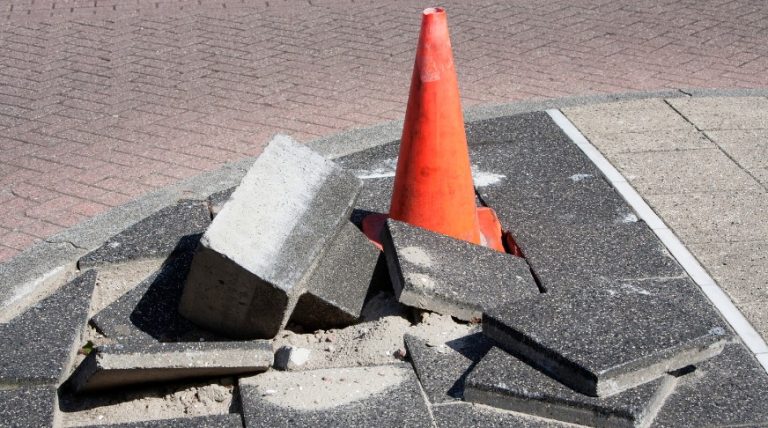Working in the construction industry often requires flexibility in scheduling to meet tight project deadlines. Understanding regulations surrounding working hours, especially on Sundays, is crucial for builders to stay compliant.
The legal framework governing construction activities on Sundays in the UK stems from the Sunday Trading Act 1994 and local authority planning permissions. These regulations aim to balance religious observances, residents’ rights, and economic needs.
This article provides an in-depth look into the regulations, exceptions, and regional differences in Sunday construction permissions across the UK.
What Are the Legal Restrictions on Building Work in the UK on Sundays?
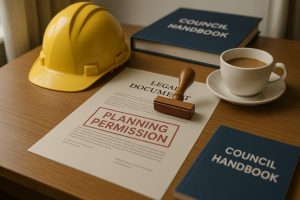
Building work on Sundays in the UK is subject to a combination of national laws, local council regulations, and planning permission conditions.
While there is no overarching legislation that explicitly bans all construction on Sundays, the reality is that most construction activities, especially those that generate noise, are restricted or discouraged.
National Legislation Impact
The Sunday Trading Act 1994 is often cited in discussions around Sunday construction, although it doesn’t directly regulate building work. This Act primarily governs the trading hours of large retail shops in England and Wales. According to the Act:
- Shops over 280 square metres can only open for six continuous hours between 10 a.m. and 6 p.m.
- Smaller shops, under 280 square metres, can open without restriction
- DIY outlets and garden centres may operate more flexibly depending on their classification
The relevance of this Act to building work lies in its restrictions on deliveries. Large stores cannot receive lorry deliveries outside the permitted hours, which affects builders who rely on Sunday morning deliveries of construction materials. This indirect limitation can delay building operations or lead to worksite downtime, even if on-site work itself isn’t prohibited.
However, it’s essential to note that the Sunday Trading Act does not cover construction sites directly. The legality of carrying out building work on Sundays hinges more on local authority planning permissions and noise control laws.
Local Authority Planning Permissions
Every construction project in the UK that requires planning permission will include conditions about operating hours, especially in areas with nearby residential properties. These permissions are tailored to the type of project, its location, and potential disruption to the local community.
Most local planning permissions include a clause similar to:
“No building operations that are audible outside the site boundary shall take place on Sundays or Bank Holidays.”
These conditions are particularly stringent in suburban and residential zones, where the emphasis is on preserving peace and minimising disruption during weekends and holidays. Commonly, planning authorities allow building work from:
- 8:00 a.m. to 6:00 p.m. on weekdays
- 8:00 a.m. to 1:00 p.m. on Saturdays
- No permitted hours on Sundays and public holidays
If a developer or contractor breaches these conditions, the local council has the power to issue enforcement notices or pursue further legal action.
The Role of the Environmental Protection Act 1990
In addition to planning laws, the Environmental Protection Act 1990 enables councils to take action against any activity that causes a statutory nuisance. This includes building works that result in:
- Excessive noise
- Dust or vibration
- Light pollution or odour (from materials or machinery)
If construction work on a Sunday is disturbing residents, the council can investigate and issue an abatement notice. Continued breaches after a notice is served may lead to fines or prosecution.
Special Designations and Quiet Zones
Some areas, such as those near schools, hospitals, religious institutions, or conservation areas, may have additional restrictions on working hours. In these places, any construction work, regardless of the day, may require special approval or must meet more stringent noise and activity standards.
Builders operating in or near these zones must pay close attention to local regulations and may need to consult with the planning department to clarify what’s allowed.
What Are the Permitted Hours for Building Work in Residential Areas?
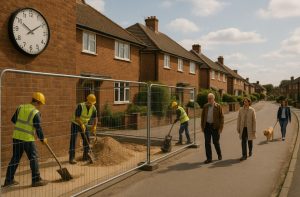
In most UK regions, local authorities provide standard guidelines for noisy construction work. These rules are designed to reduce disruption in residential neighbourhoods and maintain peace during weekends.
Below is a general overview of permitted construction hours across the UK:
| Day | Permitted Noisy Work Hours |
| Monday to Friday | 8:00 a.m. – 6:00 p.m. |
| Saturday | 8:00 a.m. – 1:00 p.m. |
| Sunday | Not Permitted |
| Bank Holidays | Not Permitted |
During these times, builders can carry out noisy operations such as drilling, hammering, or machinery use. Outside these hours, councils may issue penalties or warnings for disturbances.
Night-time noise restrictions, enforced under the Noise Act 1996, further protect residents. Between 11 p.m. and 7 a.m., any noise exceeding 34dBA is prohibited. Construction equipment is unlikely to meet this noise threshold, making nighttime and early morning building work practically impossible in most cases.
Are There Exceptions to Sunday Building Work Rules?
While most local councils across the UK prohibit building work on Sundays, there are certain exceptions under which limited or specific types of construction activities may be allowed.
These exceptions typically depend on the urgency, noise level, location, and nature of the work being carried out. However, any exception still comes with caveats, and in many cases, prior approval or post-notification to the local council is essential.
Emergency Works
One of the most widely accepted exceptions is for emergency construction or repair work. If a building becomes unsafe due to structural failure, flooding, fire damage, or any other unforeseen event that poses a danger to life, health, or property, emergency repairs can be undertaken immediately even on a Sunday.
Examples include:
- Repairing a collapsed roof to prevent injury
- Stabilising a structure after storm damage
- Fixing a burst pipe or broken boiler causing flooding
Although emergency work is allowed without prior consent, it’s still good practice to notify the local council as soon as possible afterward. This can help avoid disputes with neighbours and ensure that no unnecessary enforcement actions are taken.
Internal Work Not Audible Outside the Property
Some councils allow quiet, non-disruptive internal work on Sundays, provided the noise does not travel beyond the building where the work is being done. These types of tasks are generally tolerated without prior approval if they are carried out indoors and using manual tools or low-noise equipment.
Acceptable tasks often include:
- Painting and decorating
- Tiling and flooring
- Electrical or plumbing work using hand tools
- Installation of kitchen or bathroom units
Builders and homeowners must ensure that no audible noise reaches adjacent properties. If a neighbour makes a complaint, the council may investigate and could still classify the work as a nuisance if the sound is considered intrusive.
Work Inside Soundproofed or Enclosed Structures
For commercial or large residential sites that have been properly sound-insulated, councils may be more lenient regarding Sunday work. If a building is fully enclosed, and all construction noise is contained within the premises, certain tasks may proceed.
This is more likely to apply to:
- High-rise developments in commercial districts
- Refurbishments inside office buildings
- Internal shop fit-outs in retail units
Even in these cases, the builder typically must apply for special permission or ensure that existing planning consent allows such activities. Soundproofing does not grant automatic permission, but it can be a strong supporting argument when requesting an exemption.
Pre-approved Sunday Work in Planning Permission
Some planning permissions include pre-approved clauses that allow work on Sundays under strict conditions. This is more likely in city centres or commercial zones where residential disruption is minimal, or where construction timelines are especially tight, such as in regeneration projects or major infrastructure schemes.
These conditions may include:
- Only carrying out specified low-noise activities
- Limiting working hours, such as between 10 a.m. and 4 p.m.
- Using only specific access routes to avoid disturbance
These permissions are rare and usually granted only after thorough consultation during the planning application process.
Small-scale Domestic Work Without Planning Permission
Homeowners engaging in minor improvement projects that do not require formal planning permission may have more flexibility in performing tasks on Sundays. However, they are still bound by general noise nuisance laws under the Environmental Protection Act.
Examples of permissible small domestic works:
- Assembling furniture
- Replacing fixtures and fittings
- Painting or wallpapering
Though this work may be legally allowed, excessive noise or prolonged activities could still attract complaints. Homeowners should act considerately, especially in semi-detached or terraced housing where noise travels more easily.
Special Event or Urgent Completion Deadlines
In rare cases, builders may apply for temporary permission to work on Sundays due to tight project deadlines, contractual obligations, or preparation for public events. Local councils will only approve such requests if:
- There’s a strong, documented justification
- The work is vital and cannot be completed within standard hours
- Steps will be taken to minimise noise and disruption
These applications must be made in advance, and councils often impose specific limits, such as reduced hours or restricted machinery use. Failure to follow those conditions may result in permission being revoked.
Local Discretion and Case-by-Case Review
Ultimately, local councils have discretion to assess whether Sunday building work should be permitted on a case-by-case basis. They will evaluate:
- The proximity of neighbours and likelihood of disturbance
- The type of building and nature of the task
- Historical complaints or previous enforcement actions on the site
- Measures proposed to reduce impact (e.g. noise barriers or quieter tools)
Builders who rely on supposed exceptions without consulting the council or reviewing their planning conditions risk fines, stop orders, or even legal action. It’s always recommended to document all communications with the local authority and get decisions confirmed in writing when possible.
How Do Local Councils Enforce Sunday Construction Laws?
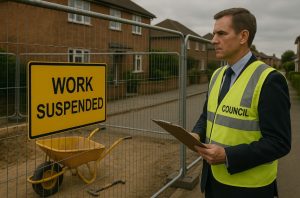
Enforcement is typically handled by the council’s Environmental Health team or planning enforcement officers. These teams investigate complaints and check if work is breaching planning conditions.
Common steps councils take in enforcement include:
- Sending officers to inspect the site and verify noise or working hour violations
- Issuing informal warnings requesting the builder to cease work immediately
- Sending formal enforcement notices which may lead to prosecution if ignored
- Seeking court injunctions to prevent further breaches
Councils can also work with law enforcement if situations escalate. Penalties range from fixed fines to prosecution for repeated violations.
What Should Builders Know About Noise Restrictions on Sundays?
Builders must take into account the type of work being conducted, the tools being used, and how audible the work is beyond the property boundary.
Typical restrictions include:
- No use of pneumatic drills, circular saws, or heavy machinery
- No external structural work such as roofing or wall construction
- No deliveries or site waste removal
Activities generally considered acceptable:
- Internal painting, plumbing, or electrical fitting
- Using manual tools like screwdrivers or paintbrushes
- Small indoor tasks that are inaudible outside
Clear communication with neighbours can prevent complaints even if the work is within legal limits. Where planning permissions are unclear, builders should contact the local council for clarification.
Can DIY Projects Be Done on Sundays in the UK?
DIY projects by homeowners often fall outside the scope of professional planning permissions, especially if they don’t involve structural changes or significant noise. However, they’re still subject to noise and nuisance laws.
Guidelines for DIY work on Sundays:
- Keep noise minimal and during daytime hours only
- Avoid power tools or machinery with high decibel outputs
- Refrain from working in outdoor spaces if the task is noisy
Neighbour complaints can still result in action by the local council, who may request that work be ceased immediately. Repeat disturbances may lead to legal orders or penalties.
Are Bank Holidays Treated the Same as Sundays for Building Work?
In most local authority areas, Bank Holidays are treated the same as Sundays when it comes to construction restrictions. This means:
- No noisy work is permitted without special council permission
- Emergency and quiet internal tasks may be allowed under discretion
- Planning permissions should be reviewed to check for any specific clauses related to Bank Holidays
Councils treat these days as particularly sensitive, especially in residential zones. Builders who wish to work on Bank Holidays must submit requests well in advance and may be subject to strict conditions if approval is granted.
How Can You Stay Compliant with Sunday Construction Regulations?
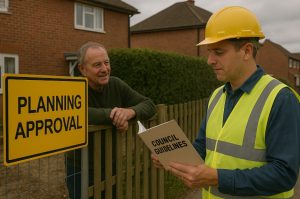
Staying compliant involves careful planning, community communication, and a solid understanding of local rules. Builders should always:
- Review their planning permission for exact working hours
- Avoid scheduling deliveries or noisy activities on Sundays or Bank Holidays
- Inform nearby residents of any authorised Sunday activities
- Apply for additional permissions if work outside normal hours is necessary
Some councils allow for temporary changes to working hours through a request process. These must include a justification for extended hours, details of mitigation plans for noise, and contact information for a responsible site manager.
What Are the Consequences of Ignoring Sunday Work Restrictions?
The penalties for unauthorised work on Sundays vary by local authority but can be severe for repeat offences or major breaches.
| Violation Type | Possible Penalty |
| Minor first-time infraction | Verbal or written warning |
| Moderate noise complaints | Fixed penalty notices (from £100) |
| Continued or serious breach | Prosecution and fines up to £5,000 |
| Ignoring enforcement orders | Court injunctions, possible imprisonment |
Besides financial repercussions, violating work restrictions can damage a builder’s reputation and lead to complications with future planning permissions or tenders.
Conclusion: Should You Avoid Building Work on Sundays in the UK?
In most cases, yes. Unless you have explicit planning permission or are conducting quiet, non-disruptive tasks, it’s best to avoid building work on Sundays. Builders should always prioritise local regulations, seek clarity from councils, and plan projects accordingly to avoid legal and social fallout.
Frequently Asked Questions
Can builders carry out work early in the morning on Sundays?
No. Most UK councils prohibit noisy construction on Sundays entirely, including early hours.
Is noisy garden work allowed on Sundays in the UK?
Only if it’s quiet and doesn’t disturb neighbours. Power tools like mowers and strimmers should be avoided.
What should I do if my neighbour is building on a Sunday?
Contact your local council’s Environmental Health department to report noise complaints.
Do building sites need special permits for weekend work?
Yes. Any non-standard hours require written permission from the local planning authority.
Are apartment buildings under different noise regulations?
Noise laws apply equally but apartment dwellers may be more affected due to shared walls, triggering quicker responses from councils.
What is the role of the Environmental Health Officer?
They investigate noise complaints and enforce rules under the Environmental Protection Act 1990 and Noise Act 1996.
Can local councils issue on-the-spot fines for noise violations?
Yes, particularly for repeat offenders or in response to serious breaches of planning conditions.

